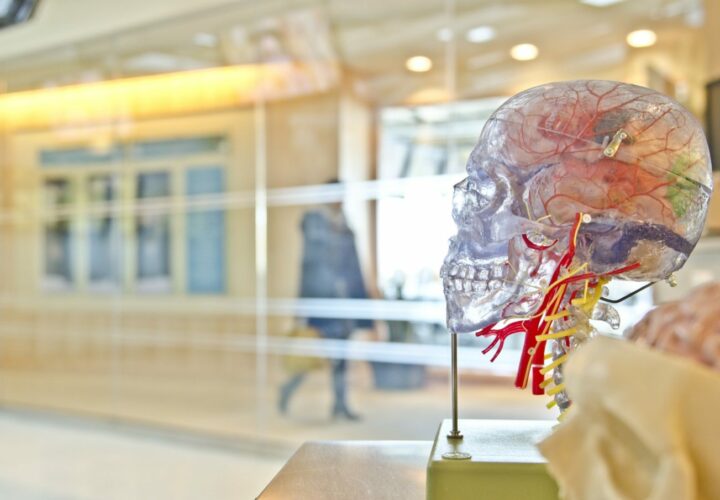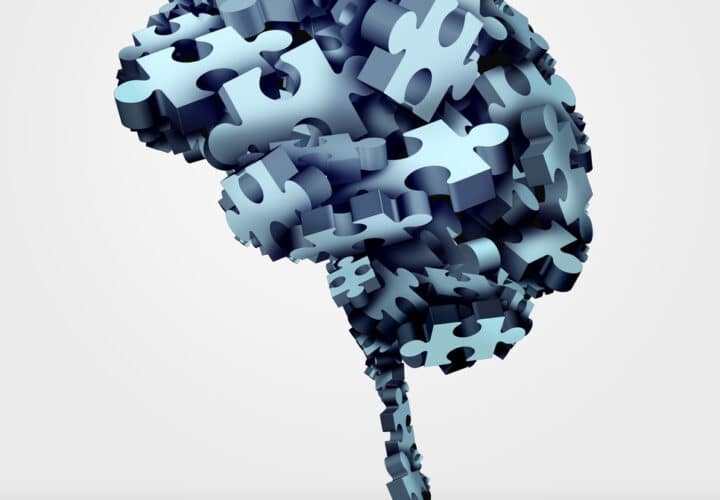Imagine being told you are living with Alzheimer's disease only to discover you have been misdiagnosed and are suffering from another neurodegenerative condition.
At 52 years old, Mike Belleville was diagnosed with early-onset Alzheimer’s. Several years later, he was reevaluated and learned he has Lewy body dementia (LBD), a disease many researchers believe is the second most common form of dementia, affecting an estimated 1.3 million Americans. Belleville is among a number of people who have experienced the pain of misdiagnosis and are living with what the Lewy Body Dementia Association (LBDA) calls “the most misdiagnosed form of dementia.”
While Alzheimer’s and Lewy body dementia share some symptoms, there has not been as much research on the latter, said Dag Aarsland, a leading LBD and Parkinson’s researcher from King’s College in London and a director of research at the University of Stavanger’s Centre for Age-Related Medicine.
According to Aarsland, this lack of awareness about LBD and its symptoms leads to a number of Alzheimer’s misdiagnoses. However, Aarsland believes it should be relatively easy for doctors to tell the difference between the two conditions with the right tools and an extensive conversation with patients and their caregivers about their medical history.
- Aarsland said that unlike Alzheimer’s, where memory issues are the main symptom until later stages, Lewy body dementia patients often suffer from hallucinations, sleep disorders and gait problems or balance issues early on.
- While there are no medications that can cure Alzheimer’s or LBD, some medications like Aricept may temporarily slow the progression of Lewy body dementia and are often more effective on those with LBD than Alzheimer’s.
- Other medications that are prescribed for Parkinson’s or used to treat hallucinations may help relieve some LBD symptoms as well.
Being Patient spoke to Aarsland about the differences between Alzheimer’s, Lewy body dementia and Parkinson’s, if genetics impact whether or not someone will develop LBD, treatment options and where research on the neurodegenerative condition is headed.
The Difference Between Lewy Body Dementia and Alzheimer’s
Being Patient: How is Lewy body dementia different from Alzheimer’s disease?
Dag Aarsland: When a pathologist looks into the brain of someone with Lewy body disease versus Alzheimer’s, they see different changes. More importantly, for patients and carers, Lewy body disease often causes behavioral symptoms, whereas it’s more common for Alzheimer’s to cause memory or language problems. With Lewy body disease, we also have memory and language problems, but there are a lot of other symptoms which are also very problematic. These include psychiatric symptoms such as hallucinations, motor symptoms that are similar to those we see in Parkinson’s disease, very specific sleep disorders and a whole list of other changes. It’s a more complex symptom presentation for these patients.
Being Patient: Some people have been diagnosed with early-onset Alzheimer’s only to find out they have Lewy body dementia. Alzheimer’s can be diagnosed with a PET scan or spinal tap by looking at the presence of beta-amyloid plaques or tau tangles in the brain. Does Lewy body dementia present itself similarly to Alzheimer’s in the initial stages?
Dag Aarsland: Yes and no. There are some similarities, but there are also very specific differences. It’s actually not that difficult to diagnose Lewy body disease. In my view, the main challenge is that people don’t know a lot about it. Doctors don’t consider Lewy body disease as a potential diagnosis and they don’t ask the questions or do the examinations that are required to make a diagnosis.
How Can Doctors Diagnose Lewy Body Dementia?
Being Patient: How can doctors accurately diagnose someone with Lewy body dementia?
Dag Aarsland: As always, the most important thing is to talk carefully with a patient and carer who knows the patient and discuss what symptoms they have experienced. Doctors should ask whether they are having hallucinations, as well as whether they have tremors, slow movements, gait problems or balance issues. If the symptom profile resembles Lewy body disease, then we have some imaging and tests that can be used to secure the diagnosis, although it’s not mandatory. You can make the diagnosis by just interviewing and examining the patient.
Being Patient: Those living with Alzheimer’s often experience hallucinations in the later stages. With Lewy body dementia, do patients experience hallucinations early on?
Dag Aarsland: They do happen early on. With some patients, they may be the first symptom, but usually, patients have memory or other cognitive problems and hallucinations. Hallucinations in a person with very early dementia or even before dementia should make doctors suspicious that the patient does not have Alzheimer’s disease, but Lewy body disease.
What Is the Link Between Parkinson’s and Lewy Body Dementia?
Being Patient: Are Parkinson’s disease and Lewy body dementia related?
Dag Aarsland: Yes, they’re related in terms of symptoms and the brain changes. Many scientists consider Parkinson’s and Lewy body dementia as a continuum of disease rather than two separate diseases. But there are very active and lively discussions about that. There are arguments for separating and combining them, but there are many similarities.
Being Patient: Do you group Lewy body dementia with Parkinson’s disease in your research?
Dag Aarsland: From a research point-of-view, we try to separate them. We identify the specifics and categorize patients in different groups and study them carefully in order to see how they relate. In clinical practice, it’s different. I also see patients with Parkinson’s and unfortunately, many of them develop dementia and hallucinations or memory problems. In clinical practice, it’s very much the same challenges for patients, carers and the doctor in terms of findings and the right therapy.
Is There a Genetic Link to Lewy Body Dementia?
Being Patient: Is there a genetic link to Lewy body dementia?
Dag Aarsland: Yes. There are some interesting genetic links both with Alzheimer’s and Parkinson’s, but there also seem to be very specific genetic changes with Lewy body dementia. Unfortunately, we know much less about the genetics of Lewy body disease because in general, there has been less research conducted in this group of patients, but we are working on it and there are recent studies demonstrating that up to 60 percent of the risk of disease is genetically determined. We are now trying to look into the specific genetic changes associated with the disease. That’s not yet clear. In order to determine that, we need large groups of patients and that is more challenging than with Parkinson’s and Alzheimer’s, but we are working on that and the importance of studying the genes is that they will give us a clue about mechanisms in the brain and possible therapeutic agents we can use to help patients.
Being Patient: To date, have you identified any genetic variant associated with Lewy body dementia?
Dag Aarsland: Yes and no. We don’t know of a familial disease as we have with Alzheimer’s, where a small proportion of patients have a genetically determined familial disease as with the ApoE4 gene that elevates Alzheimer’s risk. However, there is a similarity to Alzheimer’s because ApoE4 is also a risk for Lewy body dementia. Again, we don’t have any clear specific genetic risks that indicate patients will get dementia with Lewy bodies.
Lewy Body Dementia Progression and Treatment
Being Patient: How common is Lewy body dementia?
Dag Aarsland: From a scientific point of view, we don’t actually know how common it is, but based on the studies that exist, I think most scientists would agree that if you look at a whole group of people with dementia, between 10–15 percent of all patients with dementia have Lewy body dementia. That’s a big group of people. We usually consider Lewy body dementia to be the second most common form of dementia after Alzheimer’s disease, together with vascular dementia.
Being Patient: Can people have Lewy body dementia and Alzheimer’s at the same time?
Dag Aarsland: The answer is twofold: On the one hand, we know that the majority of patients with Lewy body disease will have Alzheimer’s-like changes in their brain. We can find that by looking at amyloid plaques and when we study cerebral spinal fluid. On the other hand, that does not mean that it is actually Alzheimer’s, but probably that the pathological mechanisms leading to Lewy body dementia also influence the changes we see with Alzheimer’s. The different proteins which are active and causing disease seem to interact so that the protein responsible for causing Lewy body disease, which is called alpha-synuclein, can also influence the proteins leading to Alzheimer’s: the tau protein and amyloid. If there is one change, you have a higher risk of getting the other change. If you have both types of brain changes, then these patients have a more severe disease course and rapid progression, unfortunately.
Being Patient: How quickly does Lewy body dementia progress? Is it different than other forms of dementia?
Dag Aarsland: If you look at Lewy body patients as a group, they have a more rapid progression and severe disease course. If you look at prognostic outcomes, you’ll see that it is a more severe disease than Alzheimer’s disease. But with that, there are huge variations as we see with Alzheimer’s in the course of the disease. There’s an even larger variation in Lewy body dementia in terms of the rate of progression so I would be reluctant to say that this or that course indicates that it is not Lewy body disease. We just have to accept that there are big variations in the prognosis and that’s something we want to better understand. Why do some patients decline more rapidly than others? That’s also related to the response to medications. Some respond quite well. Many would agree that the treatments may be more effective in Lewy body disease than with Alzheimer’s.
Being Patient: What are the treatments for Lewy body dementia and are there any prevention strategies?
Dag Aarsland: Unfortunately, since there’s much less research, we know less about preventative strategies for Lewy body disease compared to Alzheimer’s and Parkinson’s, but if you look at lifestyle and prevention, I think when strategies seem to be protective for Alzheimer’s, like physical exercise, a healthy diet, mental activities, etc., they should also be implemented for people with Lewy body disease. There’s no research there but no good argument as to why they should not be effective for this group of patients.
In terms of medications, we don’t know a lot, but we do know that the Alzheimer’s drugs—the cholinesterase inhibitors—are beneficial for Lewy body disease dementias. In some patients with Lewy body disease, they may be particularly effective. Every patient should use those as a basis. A drug like Aricept should be a base therapy, but obviously, there is no cure for Alzheimer’s and Lewy body dementia; the effect is limited, though maybe to some extent, it can reduce the progression of memory issues. However, it doesn’t help with hallucinations, Parkinsonism and sleep problems. For these symptoms, we need different therapies but there’s not much research guiding us so we don’t have good evidence recommending this or that treatment.
There is some evidence that anti-Parkinsonism medication may help people with motor symptoms. The symptoms are very different, so the challenges vary markedly from one patient to another. One patient may have memory issues as the main problem while another may have tremors and a third patient may have vision issues or hallucinations. These lead to different treatment strategies that I discuss with the patients and the main symptom they want to address. That is a little bit different from Alzheimer’s where memory issues are usually the main problem.






Altzheimers was never mentioned forgot,sorry!
Thank you for posting this.
10 yrs ago, mom was forgetful, not paying bills, losing things, leaving the house in the night, uncontrollable blood pressure, vacant look in her eyes, and having what she described as “epiphanies” in her dreams. Today at 82, she has uncontrollable HBP, head tremor when looking down, facial mask, sleeps 10+ hrs pm, naps 4 hrs, bowel/ bladder incontinence, cognitive fluctuations, difficulty with language and numbers, cannot use the phone, cook, drive, gets panicky when left alone. She has kidney failure. Balance/ movements slow but ok. I’ve shared concerns with her Kaiser Dr, that I’ve thought for yrs that mom has LBD but he’s satisfied with “mod to advanced dementia”. Her PCP does have her on aricept and zoloft. He keeps increasing her bp meds to no avail. Do mom’s symptoms sounds like LBD? When mom passes I think an autopsy is wise. I know of the isolated gene, so genetic testing could help with answers as well. Help.
My wife is 53 and has LBD diagnosed 3 years ago. She has been on Aricept for a year. The drug had a dramatic impact on her cognition. Within a 3 to 4 weeks, her cognition improved from about 3 or 4 on a 10 point scale to 7. Her hallucinations, which were daily before Aricept, completely stopped for nearly a year. She just started seeing bugs again.